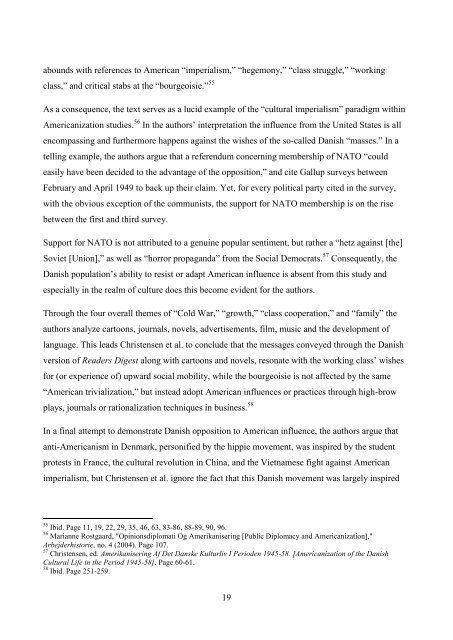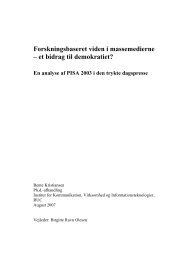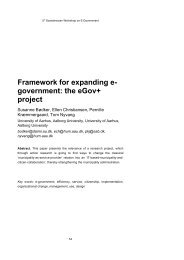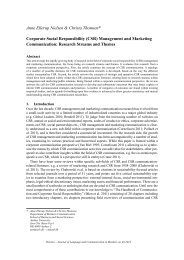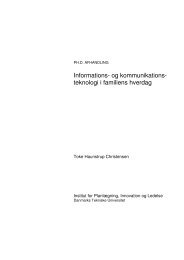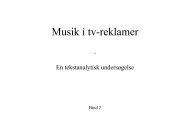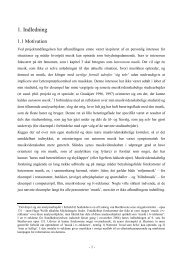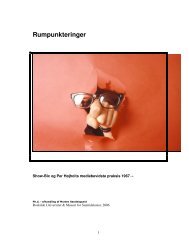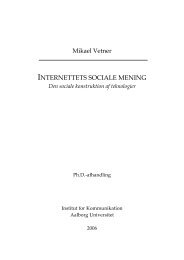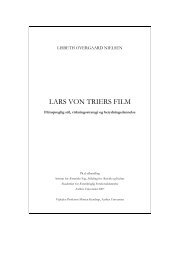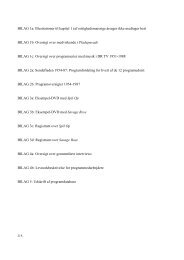The Jeremiad Over Journalism
The Jeremiad Over Journalism
The Jeremiad Over Journalism
You also want an ePaper? Increase the reach of your titles
YUMPU automatically turns print PDFs into web optimized ePapers that Google loves.
abounds with references to American ―imperialism,‖ ―hegemony,‖ ―class struggle,‖ ―working<br />
class,‖ and critical stabs at the ―bourgeoisie.‖ 55<br />
As a consequence, the text serves as a lucid example of the ―cultural imperialism‖ paradigm within<br />
Americanization studies. 56 In the authors‘ interpretation the influence from the United States is all<br />
encompassing and furthermore happens against the wishes of the so-called Danish ―masses.‖ In a<br />
telling example, the authors argue that a referendum concerning membership of NATO ―could<br />
easily have been decided to the advantage of the opposition,‖ and cite Gallup surveys between<br />
February and April 1949 to back up their claim. Yet, for every political party cited in the survey,<br />
with the obvious exception of the communists, the support for NATO membership is on the rise<br />
between the first and third survey.<br />
Support for NATO is not attributed to a genuine popular sentiment, but rather a ―hetz against [the]<br />
Soviet [Union],‖ as well as ―horror propaganda‖ from the Social Democrats. 57 Consequently, the<br />
Danish population‘s ability to resist or adapt American influence is absent from this study and<br />
especially in the realm of culture does this become evident for the authors.<br />
Through the four overall themes of ―Cold War,‖ ―growth,‖ ―class cooperation,‖ and ―family‖ the<br />
authors analyze cartoons, journals, novels, advertisements, film, music and the development of<br />
language. This leads Christensen et al. to conclude that the messages conveyed through the Danish<br />
version of Readers Digest along with cartoons and novels, resonate with the working class‘ wishes<br />
for (or experience of) upward social mobility, while the bourgeoisie is not affected by the same<br />
―American trivialization,‖ but instead adopt American influences or practices through high-brow<br />
plays, journals or rationalization techniques in business. 58<br />
In a final attempt to demonstrate Danish opposition to American influence, the authors argue that<br />
anti-Americanism in Denmark, personified by the hippie movement, was inspired by the student<br />
protests in France, the cultural revolution in China, and the Vietnamese fight against American<br />
imperialism, but Christensen et al. ignore the fact that this Danish movement was largely inspired<br />
55<br />
Ibid. Page 11, 19, 22, 29, 35, 46, 63, 83-86, 88-89, 90, 96.<br />
56<br />
Marianne Rostgaard, "Opinionsdiplomati Og Amerikanisering [Public Diplomacy and Americanization],"<br />
Arbejderhistorie, no. 4 (2004). Page 107.<br />
57<br />
Christensen, ed. Amerikanisering Af Det Danske Kulturliv I Perioden 1945-58. [Americanization of the Danish<br />
Cultural Life in the Period 1945-58]. Page 60-61.<br />
58<br />
Ibid. Page 251-259.<br />
19


